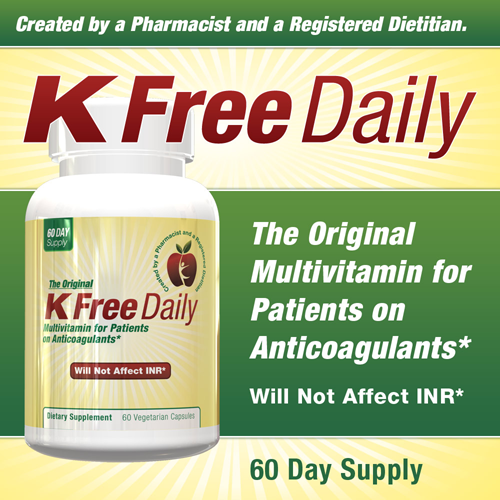Anticoagulants: Warfarin, Coumadin®, Jantoven®, or Marfarin®
Warfarin is used to prevent the formation of dangerous blood clots, also known as thrombosis, which can lead to an embolism. An embolism occurs when a blood clot migrates through the blood and becomes lodged in a vein or artery, thereby cutting off blood supply to a vital organ. Warfarin is most commonly prescribed for people who are at a higher risk of developing a thrombosis including people with a certain type of irregular heart beat (atrial fibrillation), prosthetic heart valves, deep vein thrombosis (DVT), pulmonary embolism, and people who have suffered a heart attack from coronary artery disease. Warfarin is in a class of medications called anticoagulants, often referred to as ‘blood thinners’ (1). Warfarin was approved for use in the U.S. in 1954 and is the most widely prescribed oral anticoagulant drug in North America (2).
INR
Patients on warfarin will need their International Normalization Ratio (INR) checked regularly. Some patients need it checked every 2-3 days, while others can go 30 days between tests. INR is basically a measure of how quickly a person’s blood is coagulating. It is determined by a complex mathematical equation that considers a patient’s prothrombin time (PT), the PT of a manufactured tissue factor, and a value that indicates how the particular batch of tissue factor used for that particular test compares to an internationally referenced tissue factor (International Sensitivity Index, or ISI) (1). It is a complex test made very simple with the use of a blood testing machine that calculates INR when given a blood sample.
INRTracker.com is a free web app with tools and information specifically made for Warfarin patients. For a great Warfarin diet guide see this link.
The general population has an INR of approximately 1. Patient’s on warfarin typically have a target INR of anywhere between 1.5 and 3.5 depending on the condition for which warfarin was prescribed. A higher INR indicates that a person is clotting slowly and thus less likely to form a blood clot. Patients with higher risks of developing blood clots require a higher INR. K Free Daily was specifically designed without vitamin K and other nutrients research shows may interfere with INR. K Free Daily is a safe, complete multivitamin for patients on anticoagulants.
References
2. Warfarin [Internet]. Available from: http://www.accessdata.fda.gov

